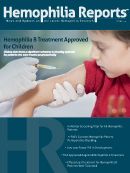rFIXFc Controls Hemophilic Patient Perioperative Bleeding
During surgery, rFIXFc controlled hemophilia patients' perioperative bleeding, according to a study published in the British Journal of Haemotology.

Long-acting recombinant factor IX Fc fusion protein (rFIXFc) effectively controlled perioperative bleeding in major and minor surgeries, with blood loss being similar among subjects with and without hemophilia, according to a study from the British Journal of Haemotology.
A global team of researchers examined rFIXFc in 123 male subjects aged at least 12 years with moderately-severe to severe hemophilia B to determine their safety, efficacy, and pharmacokinetics. The patients had a minimum of 100 exposure days (EDs) to any factor IX (FIX) product. Patients received rFIXFc weekly prophylaxis, individualized interval prophylaxis, episodic treatment/ on-demand, or perioperative management. Medications permitted in the study were thromboprophylaxis (such as heparin) and additional hemostatic treatment (such as tranexamic acid). Blood products and any other FIX products were not allowed. If patients required major surgery — minor surgery was qualified as not incorporating the use of anesthesia – they were automatically enrolled in the perioperative management arm.
Of the participants, 12 underwent major surgery, 2 underwent 2 surgeries each, which totaled 14 major surgeries. The most common frequent type of surgery was orthopedic, which was expected by the researchers in hemophilia patients. Human immunodeficiency virus (HIV) was documented in 2 patients, and hepatitis C was found in 7 patients, while 4 patients had 1 target joint and 4 subjects had >1 target joint. There were 15 minor surgeries performed on the patients, which were mostly dental procedures.
Almost all of the patients (11 of 12 total) received an initial rFIXFc prophylaxis regimen before surgery; the last patient received episodic treatment before surgery. Weekly doses were the most common, in 9 patients, and the most common dose was 50 IU/kg in 5 patients. Most of the surgeries (12 procedures) only required 1 administration of rFIXFc to maintain hemostasis during the surgical period, defined as the time from presurgery dose to end of surgery. Most subjects received 1-3 infusions on the day of surgery, and a total of 2-3 infusions during postoperative days 1-3. In most surgeries (9 procedures), the recommended doses were generally concordant; however, in the other 4 surgeries, the actual doses different from the recommendation (higher or lower, more or less frequent dosing).
In all surgeries, hemostasis levels were rated good (1/14 surgeries) or excellent (13/14 surgeries). Hemostasis was rated excellent for 10 out of 12 minor surgeries, good in 1 surgery, and fair in 1 additional surgery. Evaluations were not available in 3 minor surgeries.
Less than 1 adverse event was reported in 10 out of 12 major surgery patients. One patient reported anemia and dizziness. Three major surgery patients reported experienced less than 1 serious adverse event during the surgical and rehabilitation period. The 6 adverse events reported were assessed, and found to be unrelated to rFIXFc treatment. No patients experienced anaphylactic or vascular thrombotic events during the study period.
“These results support the safety and efficacy of rFIXFc, with prolonged dosing intervals, for perioperative haemostasis in people with moderately-severe to severe haemophilia B; data additionally indicate that perioperative consumption with long-acting rFIXFc may be lower than with conventional FIX therapies,” the authors wrote. “Further, they suggest that rFIXFc pharmacokinetics are not altered during surgery and demonstrate the utility of the rFIXFc population pharmacokinetics model for formulating dosing guidance to achieve the target plasma FIX activity levels recommended for effective perioperative management.”
